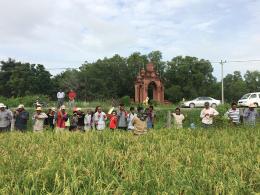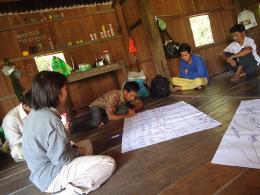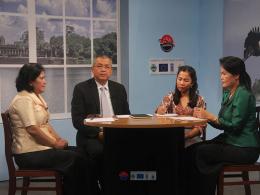Cambodia Climate Change Alliance (CCCA) - Phase II
Background
Cambodia Climate Change Alliance (CCCA) – Phase II was a comprehensive and innovative programme to address climate change in Cambodia, jointly funded by EU, UNDP and SIDA. The CCCA 2 was a unique programme implemented by the Ministry of Environment, designed to be fully aligned with and strengthen the national institutional framework for climate change.
CCCA 2 aimed to strengthen national systems and capacities to support the coordination and implementation of Cambodia’s climate change response, contributing to a greener, low-carbon, climate-resilient, equitable, sustainable, and knowledge-based society.
Three main drivers of change shape the focus of the CCCA 2 program were:
i. Strengthening the governance of climate change
ii. Orienting public and private, domestic and external resources in support of the CCCSP vision
iii. Developing human and technological capital for the climate change response
CCCA 2 Support
The CCCA 2 support, channeled through the Climate Change Department (CCD) at the General Secretariat of the National Council for Sustainable Development (GSSD), focused on strengthening capacities for coordination of Cambodia’s climate change response at different levels – global, national, sectoral, and sub-national levels – and carried out in collaboration with NCSD and CCTT, NCDD, key sectors, local authorities, and a number of other actors working on climate change.
Overall Results
Result 1: Functioning a clear governance and accountability framework for the climate change response at national and sub-national levels.
- Mainstreamed climate change issues into related core legislation;
- Defined the appropriate levels of intervention for various types of climate change activities under the decentralization and reconcentration framework;
- Developed systems and guidelines to ensure climate change mainstreaming in planning and budgeting practices;
- Consolidated piloted tools for initiation of an official dialogue with particular ministries/agencies to include successful practices in standard procedures;
- Established M&E systems at national, sector and sub-national levels.
Result 2: Orienting domestic and external finance effectively in support of climate resilient, and low carbon development
- Established partnership and donor coordination mechanisms on Climate Change;
- Embeded climate change financial expertise at national level, notably within the MOE, through designation of a focal point for institutions, civil society and the private sector;
- Supported accreditation process of a National Implementing Entity for the Adaptation Fund and the Green Climate Fund;
- Built the economic case for the Climate Change response and created momentum for increased domestic funding;
- Established and maintained a dialogue on potential measures and incentives to create a favorable environment for private sector investment;
- Supported improved tagging of climate change expenditure in the ODA database and sub-national budgets, and regular monitoring reports on climate expenditure.
Result 3: Strengthen human and technological capacities to support climate change response
- Established standards for climate change education and awareness, and established quality assurance mechanism for climate change related information products;
- Provided grants to test innovative technologies and approaches in the Cambodian context and evaluated their potential, including public-private and South-South/triangular partnerships;
- Strategically supported the Ministry of Education, Youth and Sport and selected universities to help put in place sustainable structures to develop human capital in key areas of the climate change response;
- Finalized and implemented the Knowledge Management Information System, including procedures for climate data management, development of knowledge products and learning events.






